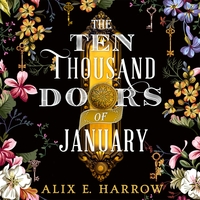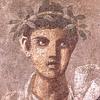Take a photo of a barcode or cover
adventurous
emotional
tense
fast-paced
Plot or Character Driven:
A mix
Strong character development:
Yes
Loveable characters:
Yes
Diverse cast of characters:
Yes
Flaws of characters a main focus:
Yes
Lovely book that tells stories within stories about finding or making portals between worlds, losing and trying to return to loved ones, and dealing with powerful people who are able to shape the world to their own desires (because they are powerful).
Our main character January is 7 at the beginning of the book and 17 at the end, and I think this book would be fine for teen readers.
Starting in 1901 and finishing in 1911 but visiting other times, through stories of the past. January is fostered by the immensely rich Mr Locke who collects archaeological specimens from around the world, sought out by January's father, who is as a result not home very much. January learns that there are portals to other worlds, but tells Mr Locke this - who is not happy that she knows - and eventually she is drawn into a race against time to figure it all out and free herself and some friends, when any step she makes could lead to it all being ruined. Very well done themes about being "a good girl" (how that might help or hinder), being "an in-between girl" aka mixed race in 1900s Vermont and Kentucky, and ideas about storytelling, magic, wonder, vs. order, progress, and power. Definitely shed some tears at the culmination of a very tense and bittersweet section!
Our main character January is 7 at the beginning of the book and 17 at the end, and I think this book would be fine for teen readers.
Starting in 1901 and finishing in 1911 but visiting other times, through stories of the past. January is fostered by the immensely rich Mr Locke who collects archaeological specimens from around the world, sought out by January's father, who is as a result not home very much. January learns that there are portals to other worlds, but tells Mr Locke this - who is not happy that she knows - and eventually she is drawn into a race against time to figure it all out and free herself and some friends, when any step she makes could lead to it all being ruined. Very well done themes about being "a good girl" (how that might help or hinder), being "an in-between girl" aka mixed race in 1900s Vermont and Kentucky, and ideas about storytelling, magic, wonder, vs. order, progress, and power. Definitely shed some tears at the culmination of a very tense and bittersweet section!
Graphic: Racism, Forced institutionalization
Moderate: Self harm, Blood, Murder, Abandonment
I see letters and doors differently now. What an easy world to fall into. I loved this book!
dark
emotional
medium-paced
Plot or Character Driven:
Character
Strong character development:
Yes
Loveable characters:
Complicated
Diverse cast of characters:
Yes
Flaws of characters a main focus:
Complicated
Alix E. Harrow’s debut novel is about a girl named January, who grows up in the early 20th century in Locke House, an extremely extravagant mansion in rural Vermont. When I first heard of this book, it piqued my interest because of the title, and I had assumed that the doors would have something to do with the house itself. The story seemed like it would be a portal fantasy but it's more of a family drama with a sprinkling of fantasy and political underpinnings. It seemed like an ordinary fantasy novel. However, Harrow had set her eyes on a more ambitious project, a novel that seemed to try to encompass several genres all at once. Perhaps because of this, the novel felt a little scatterbrained, containing the seeds of a lot of different ideas but none that were fully focused. The pacing was a bit off, too, with the last third going by in whirlwind speed compared to the rest of the novel. Sort of like me when I have a term paper deadline, honestly.
I also did not realize that this was a YA novel. Had I known that, some characters’ actions and personalities might have annoyed me less. The prose could be purple at times, but for the most part I was fine with it; it was lyrical at times, and occasionally loquacious at others, but overall it was fine. Besides the main character, January, there are a handful of important side characters; however, they show up in brief flashes or glimpses, and so you never get a strong sense of attachment or concern about any of them. The main character, I suspect, was also crafted to be relatable to people who are not me—which made it hard for me to care about what January was going through… not to mention the fact that was about seventeen, but acted with a lot less maturity at times. I don’t know if I can say any of the characters had a lasting positive impression on me throughout the book. (I'm not a dog person, so maybe if this book had a cat instead, I could have claimed at least one.) First-person narration with a slightly annoying character never works out well.
The themes were at times trying to be philosophical, other times mysterious, and overall hard to pin down. I would guess that Harrow had a lot of brilliant ideas and wanted them all to shine through in her debut novel; but instead it felt disorganized and overreaching. At times, you get a sort of historical realism, bringing up the characters’ complexions in the context of 20th century United States, only to relate it to the fact of their oppression. Their race was never incidental to their characters; it was always brought up to make a point of their oppression or low status, which felt tokenizing to me. SFF could always use more diversity, but there’s a way to write diverse characters without only bringing attention to their societal status and making them indistinguishable otherwise. Same could be said for the historical setting, too.
Occasionally you get fantasy, with talks of thousands of other worlds, but no straightforward world building or focus on any single one of them. There are hints of this with a certain world, but even that is secondary to the plot. I love worldbuilding and plot most in fantasy novels, and both were alright in this novel but not as aspirational as the author intended, perhaps. (Also, some plot ‘twists’ were extremely obvious… I was wondering if they were even meant to be twists, but perhaps this kind of thing happens more in YA than in adult fiction.) Other reviewers talked about the innovation of Harrow’s storytelling about Doors and portals, but perhaps I was less impressed because… I’ve seen that theme before, several times. There isn’t anything in the novel that felt truly ‘novel’ if you’ve read the likes of Neil Gaiman, Ursula K. Le Guin, or Philip Pullman.
This was an ambitious effort for a debut novel, and I can respect Harrow’s efforts in writing it; writing, as the book tells us, is no easy task after all. Still, there were a lot of long threads that did not always resolve in the most satisfying way; a lot of seeds of hopeful themes or character development that didn’t grow as much as they could have; and many other trifles that I had with this book. Ultimately, this book really struck a chord for a lot of people, so perhaps I’m just not its target audience. I did enjoy moments in this book here and there—otherwise I would have DNFed—but this did not live up to everything I wanted it to be.
I also did not realize that this was a YA novel. Had I known that, some characters’ actions and personalities might have annoyed me less. The prose could be purple at times, but for the most part I was fine with it; it was lyrical at times, and occasionally loquacious at others, but overall it was fine. Besides the main character, January, there are a handful of important side characters; however, they show up in brief flashes or glimpses, and so you never get a strong sense of attachment or concern about any of them. The main character, I suspect, was also crafted to be relatable to people who are not me—which made it hard for me to care about what January was going through… not to mention the fact that was about seventeen, but acted with a lot less maturity at times. I don’t know if I can say any of the characters had a lasting positive impression on me throughout the book. (I'm not a dog person, so maybe if this book had a cat instead, I could have claimed at least one.) First-person narration with a slightly annoying character never works out well.
The themes were at times trying to be philosophical, other times mysterious, and overall hard to pin down. I would guess that Harrow had a lot of brilliant ideas and wanted them all to shine through in her debut novel; but instead it felt disorganized and overreaching. At times, you get a sort of historical realism, bringing up the characters’ complexions in the context of 20th century United States, only to relate it to the fact of their oppression. Their race was never incidental to their characters; it was always brought up to make a point of their oppression or low status, which felt tokenizing to me. SFF could always use more diversity, but there’s a way to write diverse characters without only bringing attention to their societal status and making them indistinguishable otherwise. Same could be said for the historical setting, too.
Occasionally you get fantasy, with talks of thousands of other worlds, but no straightforward world building or focus on any single one of them. There are hints of this with a certain world, but even that is secondary to the plot. I love worldbuilding and plot most in fantasy novels, and both were alright in this novel but not as aspirational as the author intended, perhaps. (Also, some plot ‘twists’ were extremely obvious… I was wondering if they were even meant to be twists, but perhaps this kind of thing happens more in YA than in adult fiction.) Other reviewers talked about the innovation of Harrow’s storytelling about Doors and portals, but perhaps I was less impressed because… I’ve seen that theme before, several times. There isn’t anything in the novel that felt truly ‘novel’ if you’ve read the likes of Neil Gaiman, Ursula K. Le Guin, or Philip Pullman.
This was an ambitious effort for a debut novel, and I can respect Harrow’s efforts in writing it; writing, as the book tells us, is no easy task after all. Still, there were a lot of long threads that did not always resolve in the most satisfying way; a lot of seeds of hopeful themes or character development that didn’t grow as much as they could have; and many other trifles that I had with this book. Ultimately, this book really struck a chord for a lot of people, so perhaps I’m just not its target audience. I did enjoy moments in this book here and there—otherwise I would have DNFed—but this did not live up to everything I wanted it to be.
As previously established, I’m a sucker for a book about books. The Ten Thousand Doors of January is essentially a fantasy story that includes a book within a book. January is a wholly likable character- a feisty would-be orphan who must flee her current world to search for her family in another. This is book reads rather long, and at first I was bored with the inner book; however, it was worth the time investment as the story evolved and includes a host of riveting characters, each well developed.
adventurous
challenging
emotional
mysterious
reflective
sad
slow-paced
Plot or Character Driven:
A mix
Strong character development:
Complicated
Loveable characters:
No
Diverse cast of characters:
Yes
Flaws of characters a main focus:
Yes
adventurous
challenging
mysterious
tense
slow-paced
Plot or Character Driven:
Character
Strong character development:
No
Loveable characters:
Complicated
Diverse cast of characters:
Yes
Flaws of characters a main focus:
No
Tahle kniha je úplně jiná, než většina příběhů, které jsem kdy četla. Tak neskutečně zvláštní a přitom svým způsobem poetická.
3,5/5
La verdad es que le cuesta MUCHO arrancar y eso se nota. La primera mitad se me hizo un poco cuesta arriba. Tiene buenas ideas y me ha gustado mucho cómo está escrito, pero la sensación que me ha dejado es un poco de quedarse a medio gas. Si es verdad que el último tramo me ha gustado mucho y el final es bonito (aunque me sobraba el epílogo sobreexplicativo).
La verdad es que le cuesta MUCHO arrancar y eso se nota. La primera mitad se me hizo un poco cuesta arriba. Tiene buenas ideas y me ha gustado mucho cómo está escrito, pero la sensación que me ha dejado es un poco de quedarse a medio gas. Si es verdad que el último tramo me ha gustado mucho y el final es bonito (aunque me sobraba el epílogo sobreexplicativo).








